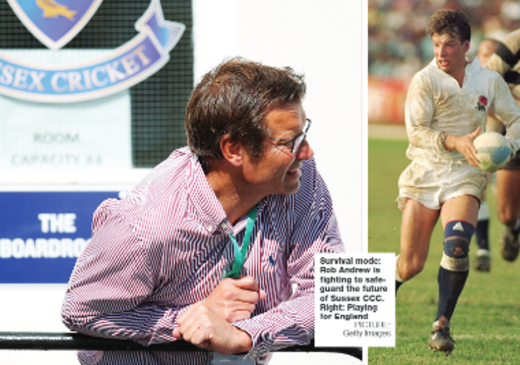
Biggest challenge of my 35 years in sport
Jeremy Blackmore talks to former RFU director Rob Andrew about rugby's future
Legendary England fly-half Rob Andrew says the COVID-19 crisis has been the most challenging six months he has experienced during a lifetime playing and working in sport.
Andrew has seen several watershed moments during the past 35 years and draws parallels to the period when rugby went professional in 1995. It was clear that it was a huge moment, but the long-term repercussions were unclear.
Andrew won 71 caps and three Grand Slams with England during the Will Carling era before moving into coaching and administration roles with Newcastle Falcons and the RFU. He is currently leading Sussex County Cricket Club’s response to the coronavirus crisis as chief executive at Hove and taking steps to ensure the club’s long-term survival.
“Clearly, there's some challenges all sports face now,” Andrew told TRP. “We’re in another massive period of change and 2020 will go down in history is another watershed landmark moment for sport. It’s getting pretty serious in some quarters, but we’ll just have to wait and see how it plays out.”
With no crowds meaning potentially no games in the Championship this year and a delayed start to the Premiership, Andrew agrees there could be irrevocable change to the structure of rugby.
“It could be absolutely. We just don't know. It appears very serious across a range of sports. Who knows how this is going to play out. We’re living with it, as we speak.
“Clearly, if there are no crowds, for most of rugby for most of this winter, that will have a devastating impact. How devastating, who knows? We're living in the moment. It feels like one of those big moments where the future will be determined, and we don't know what that future is going to look like.
“A bit like in ‘95 when rugby went professional, it was clear it was a big moment, but nobody quite knew how it was going to play out. That's happening now.”
Some of that professionalism that began in 1995 has already been reversed with some clubs going semi-professional.
“It's already started, but it's again very difficult to know what the outcome is going to be,” adds Andrew. “I think the next six months are going to be very, very critical and very challenging.”
The potential for Saracens’ England players to go a whole season without any rugby after an enforced relegation to the Championship is another unparalleled situation facing the game.
“It’s just extraordinary. You know, we've used the word unprecedented a lot in the last six months, here’s another example of that. I mean, it's just truly, truly extraordinary and very hard for people who are trying to unpick it.”
At Sussex, Andrew has put in place a package of financial measures aimed at ensuring the club’s long-term future.
“We've dealt with it on that basis from day one. I think the decisions that we have taken and we are taking, and we will continue to take, are very much based on recognising the seriousness of this position.
“This is about surviving and making sure that we do survive, which we will, and we take the tough decisions that allow us, whenever we get back to some kind of normality, that the club is able to continue.
“Because there will be sports clubs, as we are already seeing in football, who will disappear. This crisis will take down sports clubs. My job with the board is to make sure that Sussex is not one of them.
“We'll do everything we can, and we are doing everything we can, to make sure that doesn't happen. There is no doubt it's been the most challenging six months that I have seen in 35 years in sport. Every day, every week has been another challenge. But we’ll be okay.”
Andrew’s current role at Sussex is far from his first involvement in cricket. He captained Cambridge University in the early 1980s, twice playing in the Varsity match at Lord’s and scoring a first-class century against Nottinghamshire.
After making his England rugby debut at Twickenham in January 1985, he spent a season with Yorkshire CCC Seconds before pursuing an eight-year association with London Wasps and then a move back north to Newcastle Falcons.
Reflecting on his administration role with the RFU, he says: “That was an interesting role. It was a bit more political and it was a bit more a role that was trying to resolve the club v country issues in rugby that had grown up and manifested themselves through professionalism.
“They're still there really and that's probably never going to go away. So, it was really trying to improve that relationship.”
Post a comment